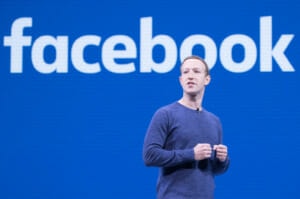Facebook is championing the “metaverse”, a concept that will allow its users to conduct their social and professional lives through virtual reality. The company recently announced a $50million (£36m) investment programme that would build their metaverse “responsibly”.
The virtual reality space will be enabled by virtual reality headsets such as Facebook’s Oculus Rift, and through a type of augmented reality where a digital layer is placed on top of reality, not unlike the software responsible for Pokemon Go.
Facebook sees their metaverse as just the first step; overtime, they hope to create an interconnected web of metaverses. Other tech firms such as Google and Apple will inevitably create platforms of their own which will allow users to switch between Facebook’s realm, into Google’s, into Apple’s and back again seamlessly.
Facebook vice president of global affairs, Nick Clegg understands that developing a habitable virtual and augmented reality will require continued investment in talent throughout the company. He also spoke about the vital role the EU will play in the success of their current hiring drive. “So today, we’re announcing a plan to create 10,000 new high-skilled jobs within the EU over the next five years,” he said. “This investment is a vote of confidence in the strength of the European tech industry and the potential of European tech talent.”
Clegg highlighted “the German biotech helping to develop the first-ever MRNA vaccine or the coalition of European neo-banks leading the future of finance. Spain is seeing record levels of investment into startups solving everything from online grocery delivery to neuroelectronics, while Sweden is on its way to becoming the world’s first cashless society by 2023.” He made this statement in the context of Facebook’s decision to invest in EU jobs over American ones.
Facebook’s investment in Europe follows a spate of controversies and lawsuits.
This announcement of the metaverse does come on the back of a considerable amount of scrutiny. Facebook has faced a tirade of criticism from many angles this past year one of those being their involvement in a U.S. employment discrimination case.
#Breaking: Facebook will pay $14.25M fine to settle a DOJ lawsuit for actively discriminating against the hiring of American workers in favor of getting their H-1B visa workers employment-based Green Cards.https://t.co/iBgCles9sg
— U.S. Tech Workers (@USTechWorkers) October 19, 2021
The case has been settled with Facebook agreeing to pay up to $14.25million following claims by the U.S. government that they discriminated against American workers and violated federal recruitment rules. The Justice Department last December filed a lawsuit accusing Facebook of giving hiring preferences to temporary workers including those who hold H-1B visas that let companies temporarily employ foreign workers in certain specialty occupations.
Facebook will pay a civil penalty of $4.75million and a further $9.5million to eligible victims of discriminatory recruitment practices. A Facebook spokesperson disputed the claims of unfairness stating, “While we strongly believe we met the federal government’s standards in our permanent labor certification (PERM) practices, we’ve reached agreements to end the ongoing litigation and move forward with our PERM program.”
Related Articles: Is the Metaverse our Next Frontier? | Facebook’s Cryptocurrency Libra: What is it and Can it Fly?
They went on to insist the company will continue to focus on hiring the best builders from both the U.S. and around the world but it is hard to ignore that this latest venture does not seem to support such a claim.
Some critics are suggesting the announcement of the metaverse is an attempt to re-establish the company’s reputation following the damaging effects of the revelations from whistleblower Frances Haugen. Haugen, a product manager on the civic integrity team at Facebook, accused the company of putting “astronomical profits before people”.
Haugen was able to support her claims by leaking tens of thousands of documents and giving damning personal testimony to US senators showing that Facebook was aware that Instagram, a platform it owns, was damaging the mental health of teenage girls specifically. Facebook denies any wrongdoing at this time despite the suggestions the platform is “toxic” to many young people.
Perhaps the strongest argument in support of the idea Facebook is attempting to re-establish itself in the wake of these scandals is the suggestion they plan to change their name. And while Facebook has released a statement saying it “doesn’t comment on rumour or speculation” reports suggest Mark Zukerberg, Facebook founder and chief executive, plans to speak about a name change at the company’s Connect conference on October 28th.

In The Photo: Mark Zukerberg giving a keynote address 2018. Photo Credit: Anthony Quintano
The Verge has reported that Facebook’s plan to change its name is to reflect its focus on building the metaverse. According to the report “the rebrand will likely position the blue Facebook app as one of many products under a parent company overseeing groups like Instagram, WhatsApp, Oculus, and more.”
Zukerberg told The Verge back in July that over the next few years “we will effectively transition from people seeing us as primarily being a social media company to being a metaverse company.”
Facebook is going through many large changes all at the same time. Perhaps this metaverse is an attempt to have some positive news coming out about the company during a challenging time.
However it cannot be denied that they are making strides beyond their competitors in the tech market and creating 10,000 jobs on the back of the heightened unemployment as a result of the pandemic is a commendable achievement.
It has been reported the creation of this metaverse could take up to 15 years but we will just have to monitor the progression and see when or indeed if Facebook has us all meeting around the boardroom table or even the Christmas Dinner table virtually in the future – with a new name, of course. Will Facebook become Faceverse or Metabook?
Editor’s Note: The opinions expressed here by Impakter.com columnists are their own, not those of Impakter.com.— In the Featured Photo: Facebook mobile display and laptop. Featured Photo Credit: Timothy Hales Bennett.









